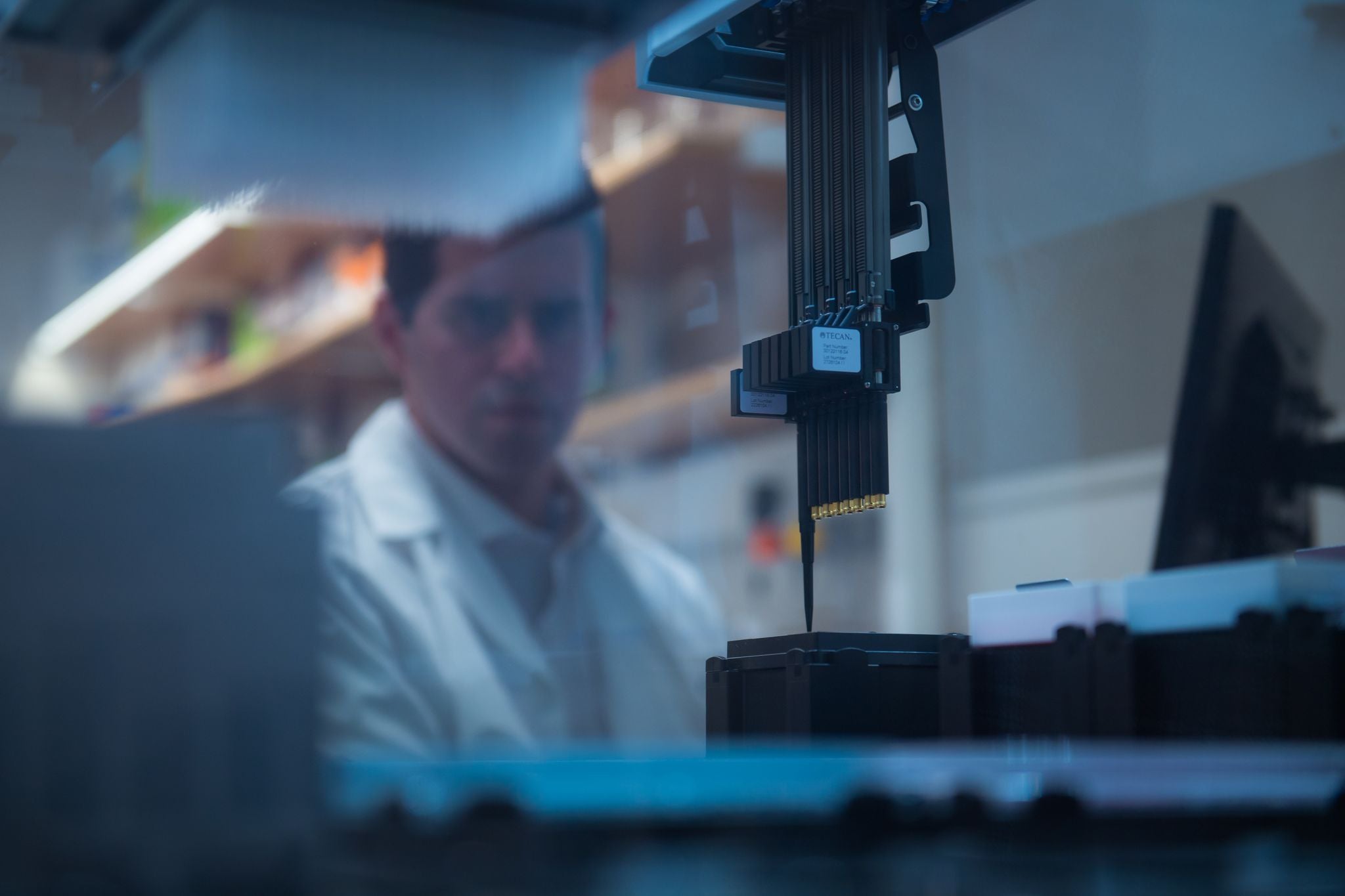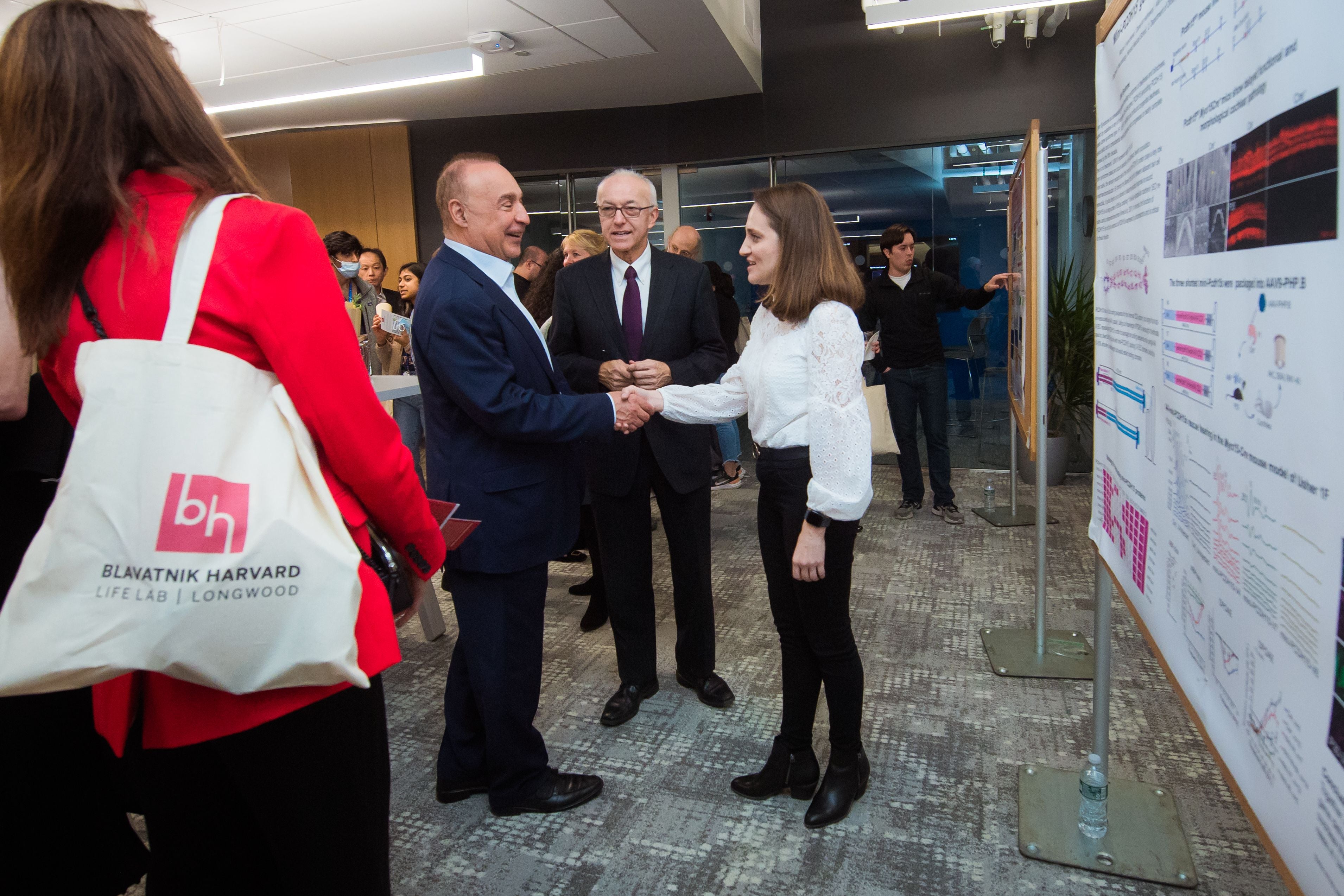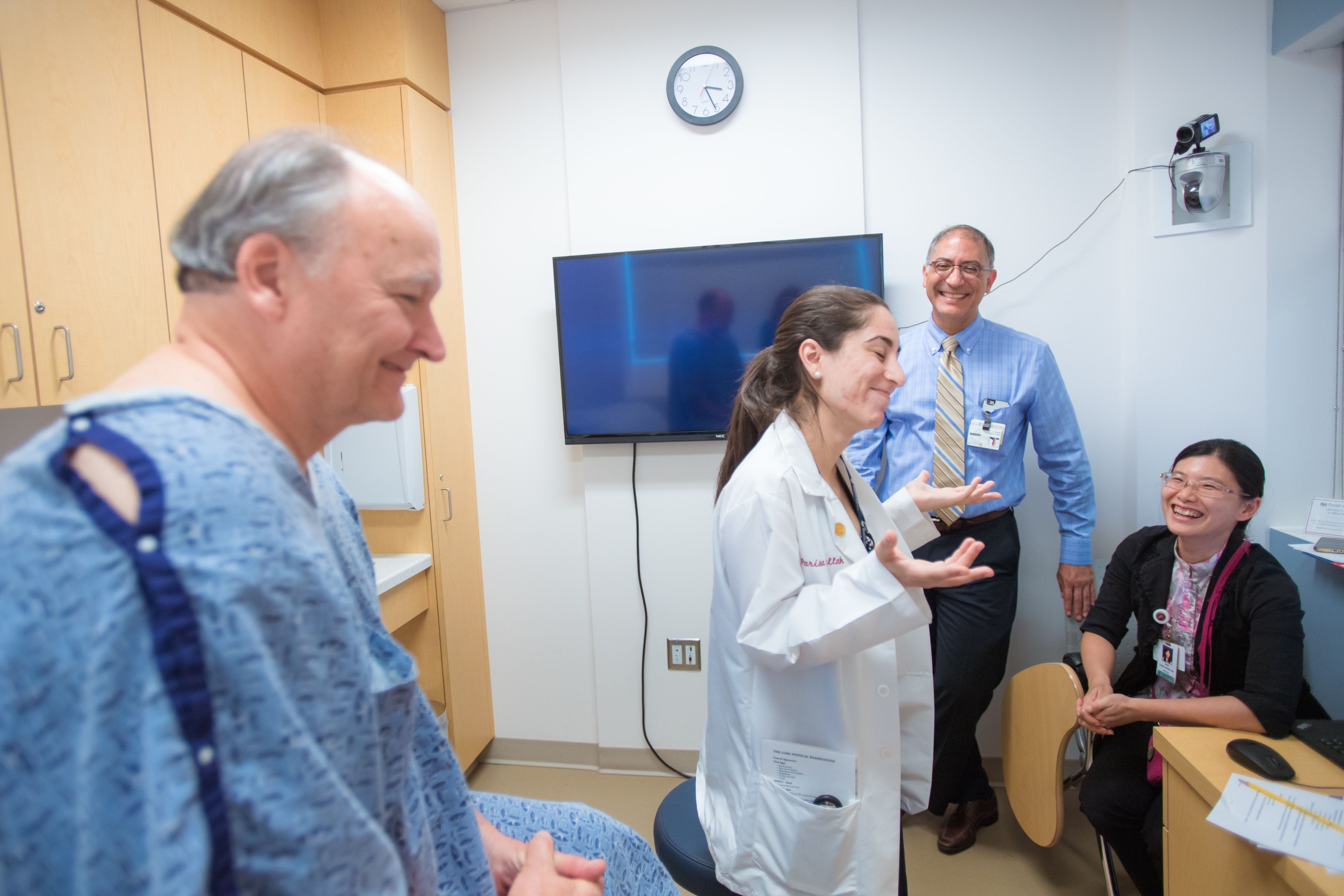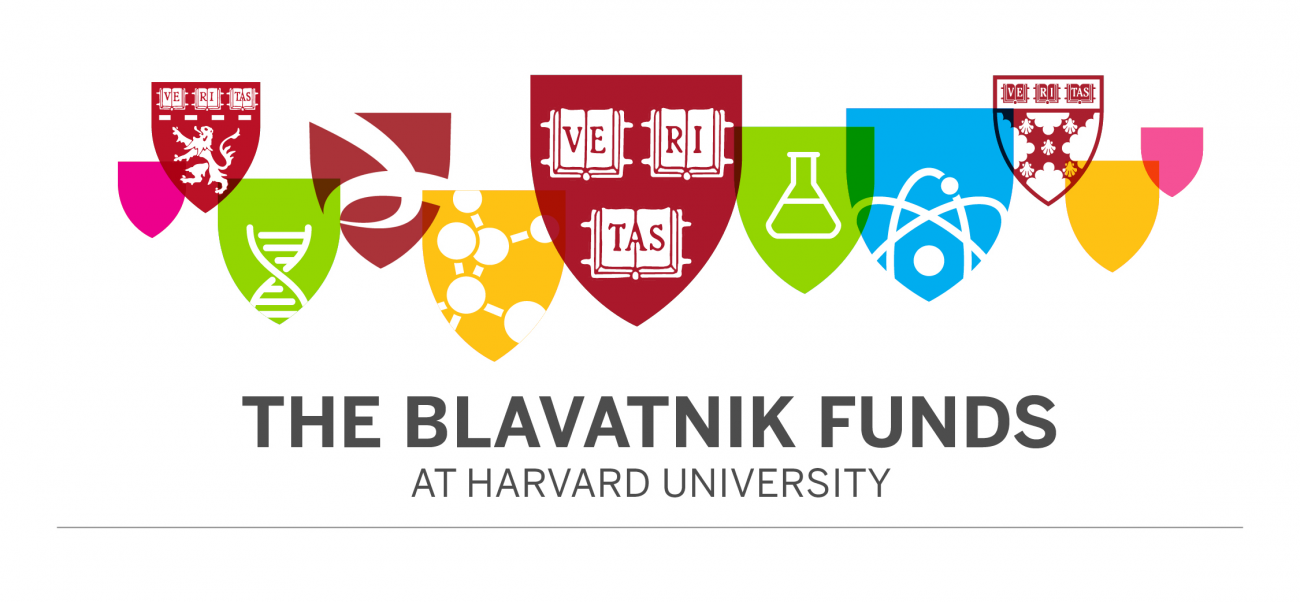Harvard Medical School (HMS) is accelerating the pace of therapeutic discovery and supporting initiatives aimed at solving some of humanity’s most acute biomedical challenges thanks to the landmark $200 million commitment from Len Blavatnik and the Blavatnik Family Foundation. This historical gift supported the creation of the Blavatnik Harvard Life Lab Longwood, the Therapeutics Initiative, the Center for Computational Biomedicine, IT infrastructure, core technologies, and aging research. Further, it propels HMS’s mission to transform health through curiosity-driven research that stimulates the development of new therapies and tools to diagnose and prevent disease.

The HMS Therapeutics Initiative advances therapeutics research, accelerates the translation of discoveries toward important medicines, and trains the inventors of these future medicines.
Key Update: In 2024, the Therapeutics Initiative launched a Harvard-wide corporate alliance with Ono Pharmaceuticals, expanding its capabilities campus-wide and strengthening its role in translational research. The Drug Discovery Sciences Core (DDSC) supported 36 drug discovery projects, advancing innovative therapies and enabling key milestones, such as intellectual property licensure and business opportunities. Five Blavatnik Therapeutics Challenge Award recipients and five Q-FASTR awardees collaborated with DDSC scientists, driving impactful progress in small-molecule, biologic, and oligonucleotide drug development.
Educational initiatives also saw significant growth, with the approval of the Master of Medical Sciences in Therapeutic Sciences program (launching in 2025) and the expansion of the Therapeutics Graduate Program, which now supports 97 active students.

Now in its second year of operations, the Blavatnik Harvard Life Lab Longwood incubates seven start-up companies, operating at 70% capacity, comparable to similar Boston-area facilities. Since July 2023, the Life Lab has onboarded three companies, with two more in the contracting process.
Key Update: Tenant company Skylark Biosciences, founded by HMS neurobiology professor David Corey, PhD, closed a $40 million funding round in April 2024 and will graduate to its first commercial lab space in winter 2025. Looking ahead, the Life Lab plans to attract new tenant companies and collaborate with the Therapeutics Graduate Program (TGP) to pilot internships for TGP students within Life Lab companies.

The Blavatnik Therapeutics Challenge Awards accelerates the development of therapeutics within HMS and its affiliated hospitals, aiming to achieve licensable intellectual property and potentially create new companies within a two-year timeframe.
Key Update: In 2024, the BTCA program concluded its fifth and final award cycle, receiving 66 proposals and funding three groundbreaking projects addressing cancer, osteoarthritis, and anemia. Over five years, the program supported 20 innovative projects, with four advancing to company formation or technology licensing and two nearing clinical development. These outcomes highlight the exceptional caliber of investigators and the program’s rigorous selection process, which has maintained a remarkable track record of scientific validity and impact.
Program Highlights
- The Dean’s Innovation Awards for the Use of Artificial Intelligence in Education, Research, and Administration encourage innovative projects that utilize generative artificial intelligence (AI) to advance HMS’s mission across education, research, and administration. The Dean’s Innovation Awards for AI in Education, Research, and Administration provided $2.2 million to 33 projects, piloting transformative uses of generative AI. These initiatives span adaptive medical education tools, breakthroughs in medical imaging and genomics, and advancements in administrative workflows. Key projects include AI-driven personalized learning platforms and automated tools for predicting biological behavior, with all efforts expected to be completed within two years.
- In 2020, HMS launched the Center for Computational Biomedicine (CCB) to create a shared resource for data and computational expertise across HMS’s Quad-based departments and labs to further enable research. The CCB transitioned into a research core to better support HMS’s Quad-based departments and AI-enabled projects. In collaboration with HMS IT, the new CCB Core has developed on-premises AI infrastructure and provided resources such as software engineering, training modules, and technical guidance. Notable achievements include developing tools for diagnosing periodontal disease, advancements in computer vision applications, and creating databases for global health initiatives. These efforts position the CCB Core as a leader in integrating AI into research and education, driving innovation and productivity across HMS.
- The Blavatnik Fund for Cryo-EM has enabled the Harvard Cryo-EM Center for Structural Biology to upgrade its two Titan Krios 300 keV electron microscopes with advanced detectors and energy filters, enhancing throughput, data quality, and user efficiency. The Center also established expertise in cryogenic electron tomography (cryo-ET), enabling high-resolution structural data collection from macromolecular complexes in situ. These advancements reduce data acquisition time, support cutting-edge research on processes like cell division and signal transmission, and position the Center as a leader in the field.
- The HMS HealthTech Fellowship Program, a 10-month program uniting HMS, SEAS, and HBS, is advancing health care innovation by training STEM leaders in biodesign and entrepreneurship. The 2024–2025 cohort, in partnership with Massachusetts General Hospital’s Department of Neurosurgery, is focusing on aging-related issues in pre-and post-operative care. Highlights include a non-invasive technology to detect breech pregnancies, a growing Anatomy of Innovation course to train aspiring innovators, and Junior HealthTech initiatives engaging underserved high school students in STEM. Fellows from 2021–2023 have founded companies addressing critical health challenges, such as treating urinary incontinence with smart patch technology and disrupting chronic sinus infection biofilms using ultrasound devices. These ventures have collectively raised millions in funding and advanced through accelerators like Primary VC, Nucleate, and The Engine’s Blueprint. The upcoming 2025–2026 cohort brings expertise spanning clinical care, AI, entrepreneurship, and business strategy.
- Supported by the Blavatnik Family Faculty Fellowship in Health and Longevity, Dr. Abraham Morgentaler launched an educational website focused on testosterone deficiency, offering reliable resources to clinicians and the public. He also established a well-received bi-annual virtual fellowship, training physicians worldwide. As founder and executive secretary of the Androgen Society, Dr. Morgentaler oversaw its 2024 meeting, which featured leading global researchers. Dr. Morgentaler and his wife, Marianne Brandon, PhD, also launched a podcast in September 2024 to translate research on human sexuality for a general audience and directed a sold-out CME course on testosterone and sexual dysfunction that attracted over 400 attendees.
- The Blavatnik Fund for Sensory Disorders Research is driving significant advancements in understanding and treating sensory conditions. At the Battelli Lab, researchers are testing a new approach to restore vision in stroke-related blindness using non-invasive brain stimulation combined with visual training, which has shown encouraging results. The Corey and Kleinstiver labs are developing a gene-editing therapy for hereditary deafness, correcting a key genetic mutation in animal models and improving hearing. The Goodrich Lab is uncovering ways to protect against hearing loss caused by noise or aging and exploring molecules that could prevent damage to inner ear cells. Other efforts include developing new treatments for chronic pain and creating the Nerve Electrical Excitability Recording System (NEERS), a tool to measure nerve function that is now moving toward clinical use.
Featured Stewardship Report
Blavatnik Institute at HMS - 2024 Stewardship Report for Blavatnik Family Foundation
Blavatnik Institute at Harvard Medical School
In recognition of this commitment, HMS named the Blavatnik Institute—an umbrella research institute that encompasses the School’s 11 basic and social science departments. Led by HMS Dean George Q. Daley, the Blavatnik Institute is home to world-class faculty working to solve the most significant problems of human health through fundamental and translational biomedical science research.

